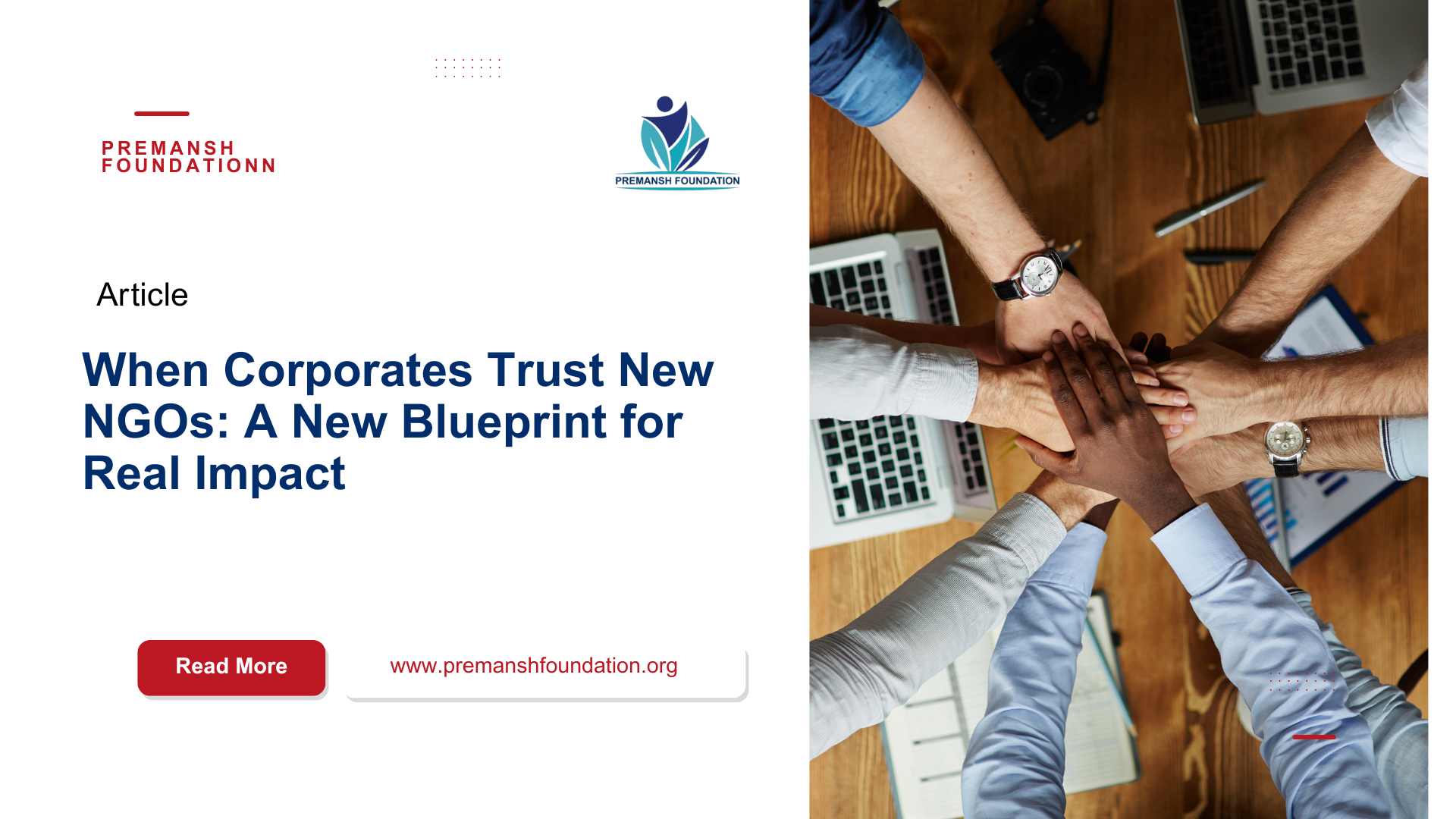CONNECT II COLLABORATE II CREATE IMPACT

Blogs

When Corporates Trust New NGOs: A New Blueprint for Real Impact
“We are not looking for saviors, we are looking for partners.”
This is what one of our community women said, as she handed us a glass of water
on a summer afternoon during a health awareness drive in rural UP. And I
paused.
It
struck me — partnerships, not patronage, are what truly move the needle
in development work. Especially when it comes to CSR and new-age NGOs.
The
Ground Reality: Where Corporates and NGOs Meet (Or Don’t)
India’s
CSR landscape has evolved remarkably in the last decade. Since the introduction
of the Companies Act, 2013, which made CSR spend mandatory, over ₹1.35
lakh crore has been invested by corporates into social development as of
FY2023 (source: Ministry of Corporate Affairs).
But
here’s the kicker:
A
large chunk of this funding goes to a small group of large, well-established
NGOs.
Meanwhile, hundreds of grassroots, passionate, new NGOs struggle for
visibility and support — not because of lack of intent, but due to lack of
access and trust.
Why Corporates Need to Look Beyond “Established” NGOs
Let’s
get honest: working with newer NGOs comes with its perceived risks — limited
compliance history, smaller teams, lesser media buzz. But here’s what they bring
to the table:
1.
Hyperlocal Understanding
New
NGOs often work deep in communities including tribal belts, semi-urban
fringes, under-resourced rural schools, where bigger players find it hard to
maintain grassroots presence.
Example:
An education-focused corporate partner saw better learning outcomes when they
shifted from a Tier-1 city partner to a district-level NGO with strong
community ties. Test scores in the pilot schools improved by 24% in just one
year.
2.
High Ownership, Low Bureaucracy
Smaller
NGOs are nimble. They innovate faster, adapt quicker, and often spend less
on admin and more on field implementation.
3.
Trust-Based Community Relationships
Their
founders often belong to the same regions or speak the same dialect. This trust
capital is powerful — especially in areas like mental health, de-addiction,
women’s safety, or financial literacy.
The Missed Opportunity: Some Startling Stats
- According
to the India CSR Outlook Report 2023, 70% of CSR funds go to
just 15% of NGOs.
- Only 8%
of total CSR partnerships are with organizations less than 5 years
old.
- However,
a UNDP India study found that new NGOs deliver 30-40% higher
community engagement scores compared to larger, national-level
partners — simply because they are more present on the ground.
A Two-Way Street: What Corporates Gain by Partnering with New NGOs
1.
Real Innovation
New
NGOs are often born from lived experiences, a teacher starting a rural STEM
lab, a survivor running a gender safety initiative, a techie building
local-language financial literacy tools. Their solutions are fresh, human, and
agile.
2.
Higher Cost-to-Impact Ratio
Every
rupee often stretches further. Because they don’t carry overheads of big
offices or multi-layered teams, impact per rupee is significantly
higher.
3. Stronger Brand Authenticity
Supporting
grassroots partners demonstrates real commitment, not just
cheque-writing. It tells stakeholders that your brand believes in empowering
the unheard.
The Way Forward: Building Responsible, Strategic Partnerships
Let’s
be clear — this is not about choosing one over the other. It’s about diversifying
the CSR portfolio wisely.
Here’s
what can help:
- Capacity
Building Support:
Offer mentorship in compliance, finance systems, or impact reporting to
smaller/new NGO partners. It’s an investment that pays long-term
dividends.
- Pilot
with Purpose:
Start small, measure well. Even a 3-month pilot with 1 district-level
NGO can give richer insights than 10 glossy reports.
- Decentralized
CSR Decisions:
Empower regional CSR heads to identify local credible partners —
those who may not rank high on Google but are rooted in their communities.
- Shared
Learning Spaces:
Organize "Cross-Learning Labs" where new and experienced
NGOs interact with corporate teams — creating mutual respect and shared
innovation.
A Real Story of Courage
At
Premansh Foundation, we once received a modest grant from a mid-sized
corporate. What started as a one-time engagement may turn into a long-term
partnership.
Why? Because we don’t just send reports. We walk them through real community
voices — WhatsApp audios of target audience speaking about how the program
brought change, school girls explaining how financial literacy changed their
home dynamics, and mothers learning to say ‘no’ to exploitative credit traps.
The
corporate don’t just fund a program. They co-create a journey.
Final Word: Shift from Compliance to Collaboration
India
doesn’t need more charity. It needs intelligent compassion.
Corporates
today have the opportunity — and responsibility — to not just fund impact, but
to enable changemakers who live and breathe it daily. Some of those
changemakers are waiting in newer, younger NGOs — full of fire, ideas, and
integrity.
All
they need is someone to believe.
Let’s build that bridge. One trustful partnership at a time.
If you’re a CSR leader looking to explore meaningful partnerships with newer NGOs, I’d love to share learnings, failures, and what’s worked on ground. Let’s talk.
#CSR #SocialImpact #GrassrootsLeadership #NGOPartnerships #FinancialInclusion #PremanshFoundation #IndiaDevelopment #AIForGood #HumanImpact



